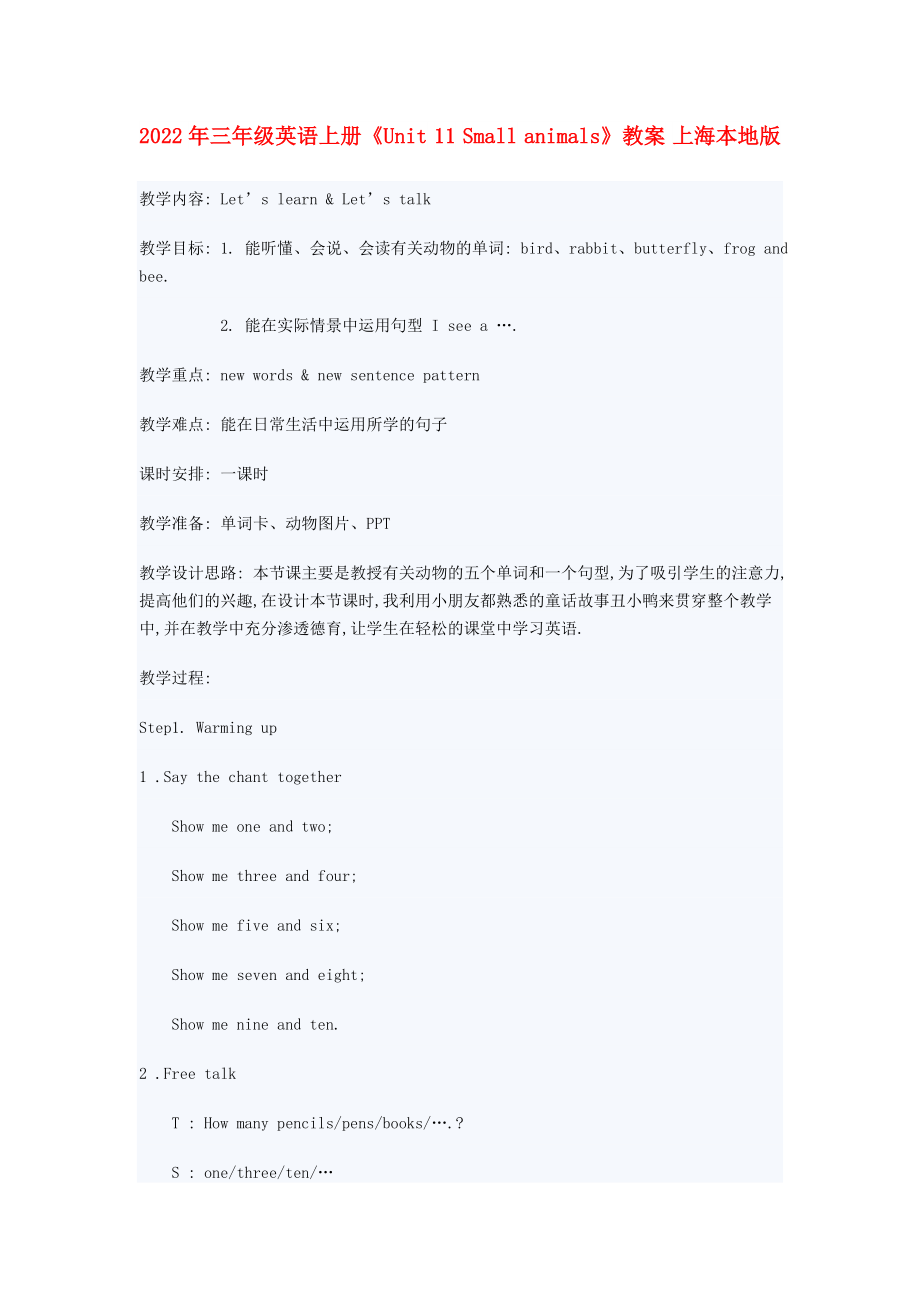《2022年三年級(jí)英語(yǔ)上冊(cè)《Unit 11 Small animals》教案 上海本地版》由會(huì)員分享�,可在線閱讀,更多相關(guān)《2022年三年級(jí)英語(yǔ)上冊(cè)《Unit 11 Small animals》教案 上海本地版(3頁(yè)珍藏版)》請(qǐng)?jiān)谘b配圖網(wǎng)上搜索��。
1�����、2022年三年級(jí)英語(yǔ)上冊(cè)《Unit 11 Small animals》教案 上海本地版
教學(xué)內(nèi)容: Let’s learn & Let’s talk
教學(xué)目標(biāo): 1. 能聽(tīng)懂、會(huì)說(shuō)���、會(huì)讀有關(guān)動(dòng)物的單詞: bird����、rabbit����、butterfly、frog and bee.
2. 能在實(shí)際情景中運(yùn)用句型 I see a ….
教學(xué)重點(diǎn): new words & new sentence pattern
教學(xué)難點(diǎn): 能在日常生活中運(yùn)用所學(xué)的句子
課時(shí)安排: 一課時(shí)
教學(xué)準(zhǔn)備: 單詞卡�、動(dòng)物圖片、PPT
教學(xué)設(shè)計(jì)思路: 本節(jié)課主要是教授有關(guān)動(dòng)物的五個(gè)單詞和一個(gè)句型,
2�、為了吸引學(xué)生的注意力,提高他們的興趣,在設(shè)計(jì)本節(jié)課時(shí),我利用小朋友都熟悉的童話故事丑小鴨來(lái)貫穿整個(gè)教學(xué)中,并在教學(xué)中充分滲透德育,讓學(xué)生在輕松的課堂中學(xué)習(xí)英語(yǔ).
教學(xué)過(guò)程:
Step1. Warming up
1 .Say the chant together
Show me one and two;
Show me three and four;
Show me five and six;
Show me seven and eight;
Show me nine and ten.
2 .Free talk
T : How many pencils
3、/pens/books/….?
S : one/three/ten/…
Step2. Presentation
1.To show ducks to the students
T : Boys and girls , Do you like story?
S : Yes.
T : Now, Today I’ll tell you a story about ducks. Please look at the screen , How many ducks ?
S : Five.
2. To show two ducks to let students to
4���、know beautiful and ugly.
3. To learn new words
T : The ugly duck is sad , so he take his luggage go away . Now, What animals he met? (present the rabbit)
S : 小白兔
T : It’s rabbit .How many rabbits?
S : One
T : So it’s a rabbit .(use gesture to do it)
4. Use the same ways to teach oth
5�����、er animals
5. Game
1) word game
2) make a dialogue
3) act some animals
6.To show a picture of Spring , to teach new sentences patterns
T: How beautiful! I see a rabbit. What do you see?
S: I see …
7. Let students can use “ I see …” to say something
Step 3 Practice
1. Listen and point
2 .Listen and say
3. Say and act.
板書(shū)設(shè)計(jì)
bee?butterfly rabbit? frog? bird
What do you see? I see a….
課后反思: 本節(jié)課的教學(xué)整個(gè)圍繞著丑小鴨的故事來(lái)展開(kāi)一切活動(dòng),學(xué)生對(duì)學(xué)習(xí)的單詞很感興趣,反應(yīng)非常積極.吸引學(xué)生的注意力,多媒體的課件,激發(fā)了學(xué)生參與課堂活動(dòng)的興趣.但在操練句型的環(huán)節(jié),應(yīng)讓學(xué)生擴(kuò)展自己的空間來(lái)運(yùn)用所學(xué)的句型.
?
 2022年三年級(jí)英語(yǔ)上冊(cè)《Unit 11 Small animals》教案 上海本地版
2022年三年級(jí)英語(yǔ)上冊(cè)《Unit 11 Small animals》教案 上海本地版

